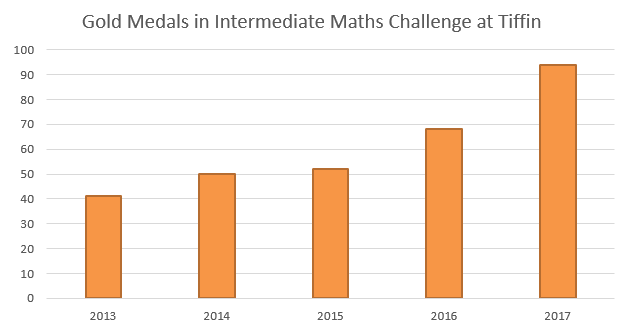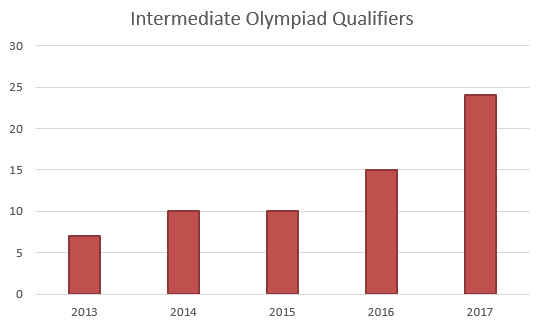A tangible way in which one might measure the success of a school's enrichment programme is to look at its performance in UK Mathematics Trust competitions. This is Tiffin's recent Intermediate Maths Challenge results compared to previous years. Gold medals are awarded to the top 6.7% of students nationally taking the competition:

That's double! Those with particularly high scores (the top 500 in each of Years 9, 10 and 11 nationally) get invited through to the Olympiad. Qualifiers have quadrupled:

And this has been consistent across all year groups, with 99 Golds in the Junior Maths Challenge in 2016 compared with 49 in 2012, and 51 Golds in the Senior Maths Challenge in 2016 compared with 19 in 2012. In 2015, having traditionally done poorly in the British Maths Olympiad (the follow on round for the Senior Challenge), we achieved 6 Distinctions with 3 invited to 'Round 2' (for the top handful nationally). In summary, it's been a good few years!
Tiffin is admittedly a selective grammar school (albeit a state one). Various measures we have used to improve UKMT results may therefore be harder or unviable to replicate in a comprehensive. Regardless, I do think there are a number of initiatives and perspectives to teaching enrichment that may be universally applicable to all schools.
It's hard to pinpoint one particular reason, especially the significant rise in 2017. But my impression is as follows:
Many schools have a designated 'UKMT person', often not the head of department, whose official responsibility it is to organise the Maths Challenges and perhaps promote them. I've heard Heads of Departments say things like "I let [person X] deal with all of that stuff". If promotion of UKMT competitions is relegated to one of the set of responsibilities for just one member of staff, there is unlikely to be a culture within the department that ever sees these competitions as more important than just an optional extra.
Not all of Tiffin's teachers may be UKMT enthusiasts, but I do feel more recently as if there a number of staff who enjoy these problems and hence casually promote them within lessons, in conversations with students, and so on. Our Head of Maths for example worked on the BMO (just for fun) on a lengthy train trip to Scotland. And our teacher with overall responsibility for the Junior level of the competition is ostensibly keen to win the UKMT's 'Team Challenge'. She's organised a significant number of training sessions and even strategically changed the heat venue we usually attend, given that the last two years we've been up against the eventual national winner!
If teachers are enthusiastic about difficult maths problems, then that inevitably rubs off on the students. When a student has worked on a difficult Olympiad problem in their own time, and is desperate to discuss it with someone, they want a proficient person who shares their enthusiasm. This enthusiasm is vital to promoting a positive problem-solving culture amongst students.
Tangential confession: my exposure to UKMT competitions was very limited at school. At the comprehensive I attended, there was no sign of any Maths Challenges. When I moved to Tiffin for Sixth Form, I did the Senior Maths Challenge having never seen a paper before. And I got a Silver certificate (albeit one question off a Gold!). That was the entire extent of my UKMT history. When I started as a teacher, I still wasn't very good at UKMT problems - I had no hope at the geometry SMC questions because I didn't know the typical strategies or feel confident in applying them even when I had worked out what to do. So I just practised a huge number of them and tried to distil everything I could about each one, compiling various tips. Eventually I got the hang of them!
5 years ago we only had a small handful of students get through to each Olympiad. And most of those tended not to do very well because they didn't really know how to approach these kind of problems and construct a lengthy proof. My impression, based on comments from students, is that these particularly high-achieving individuals were considered by the other boys as 'isolated cases', i.e. that they had a degree of mathematical natural aptitude that set them apart, which was unachievable by the general student population. It was only when we reached a 'critical mass' of high-achieving students in these Olympiads that I feel the culture shifted, and students realised that actually that with a bit of practise they could also do well in these competitions.
There is undoubtedly an increased level of competitiveness amongst students given that a much larger number of students are getting a high Olympiad score.
Maths Challenges and Olympiads are no longer considered an 'add-on'; they are integral part of the life of maths at Tiffin. There are a number of things we do:
The biggest curriculum faux pas is to partition 'core curriculum' and 'enrichment' into separate categories. There's a temptation to have separate designated 'problem solving' lessons, perhaps with some kind of NRich task or otherwise, so that the 'I've done enrichment' box can be ticked. There is a place for such lessons, and one that particularly works well for me is a 'Robot Paths' activity at the end of our Year 8 'Counting Strategies' and Probability topics. But problem solving must be much more endemic on a day to day lesson basis.
We have redesigned our Year 7 curriculum, and I produced a complete set of resources which is largely adopted by our Year 7 teachers (perhaps with some minor deviation as per the judgement of the teacher!). Our scheme of work for Year 7 was recently described by Simon Singh as "National Curriculum +", because it largely in line with the NC, but with some subtopics added (e.g. divisibility problems) and some subtopics/skills more greatly emphasised (e.g. expressing the area of composite shapes in terms of pi). More importantly, these resources have their own bespoke exercises tailored to our students, with numerous use of Maths Challenge (and even Olympiad!) questions in the latter parts of each exercise.
So a summary of my own opinion on enrichment: having a stock of harder problem-solving questions that integrates with existing curriculum and enhances topic-specific skills, rather than just ad hoc enrichment lessons that only develops more generic problem skills.
| Measure | Impact | Comments |
|---|---|---|
| Maths Clubs | Medium | Whenever I get an email from other schools about how they can develop enrichment at their own school, there is often the assumption that is our clubs which has largely contributed to our success. I don't think this is the case: The Intermediate club in particular is not very well attended, and while the few who did attend this year did very well, most of the high Olympiad scores are achieved by students who don't attend the clubs (perhaps because of other lunchtime commitments, e.g. choir). The Senior club has been more successful, particularly in helping students prepare long-term for university interviews. But I sense that the biggest impact is when students are doing these problems independently. |
| Teacher CPD | High | Practise some Maths Challenge and Olympiad papers yourself! On my homework platform (launching at the end of April 2017), UKMT have kindly made their backlog of papers available, which you can practise with instant feedback on whether you got each question right or wrong. I have been asked to get involved in a potential collaborative project between the UKMT and FMSP (Further Maths Support Programme), aimed at teacher CPD for problem solving. Watch this space! |
| Formative Feedback/Mentoring Programme | Very High | Even if our number of Olympiad qualifiers at Intermediate (Year 9-11) level has been on the rise across the last 5 years, our Intermediate Olympiad results were pretty poor until 2017 (where we achieved 8 Distinctions, 6 Medals and 4 Book Prizes, where a 'Book Prize' means top 50 students nationally). This was largely due to Year 9 (and below), who achieved 6 of these 8 distinctions. Year 9 was the one year in which our new Mentoring programme (described earlier) didn't fizzle out in terms of lack of student submissions. One student's Olympiad past paper solutions earlier in the year were pretty terrible - the proofs were 'incomplete' (in the sense he hadn't justified he had found the only solutions) and his approaches often inelegant. He probably won't mind me saying this because he ended up with 52/60 in the real thing (just a single mark outside the top 50 in the country). There were other students where I feel this formative written feedback helped. One Year 7, who achieved a perfect score of 60/60, had submitted an entire notepad of solutions! Each question on the mentoring sheets were marked out of 10. We started off with UKMT's official 'mentoring sheets', but found these were more geared towards students who had already had success at the Olympiads and were pushing at the next level up. We switched to past Olympiad papers. |
| Maths Challenge 'lesson starters' | Low | I compiled various Powerpoints where each slide had two UKMT problems, one harder and one easier one. I numbered each slide by week, i.e. Week 1, Week 2, etc. The idea was to give students 5 minutes at the start of one lesson each week, before which students would vote on the correct answer and a volunteer asked to explain their solution. This fizzled out because (a) It significantly reduced the amount of time I could spend on the main topic that lesson (b) For the few students who were just interested in learning about the main topic of the lesson, they switched off during this portion of the lesson because they perceived it as not helping them towards their next assessment and (c) As mentioned earlier, the problem solving did not integrate with the main curriculum. |
| Maths Challenge lessons | Medium | With my Year 7-9 classes, I will occasionally have a lesson (perhaps one every three weeks) where I just give all the students a particular past paper, and largely just let them get on with it. I have a Powerpoint with the solutions to each year, so I can gradually reveal answers throughout the lesson and students feel like they need to keep up. A couple of less enthusiastic students perceive this as a 'doss lesson' and don't get through as many questions as they perhaps could, but students largely enjoy this and like working with their neighbour. |
| DrFrostMaths homework platform (launched April) | ? | The jury is out on this one. But many students trialling this platform did practise a number of IMC papers in the run up to the real thing, and our results were considerably better this year. In the recent Year 7 JMC qualifier (all Year 7s take the qualifier, with the top 50% being entered for the real thing soon after), the average score was 58/102 (the paper had one in every 4 questions removed to make it 45 minutes long instead of an hour). Last year the average Year 7 qualifier score was 49. The curriculum is exactly the same as last year and attendance at the Junior club similar (which is quite popular with Year 7s). So there's evidence that considerable use by Year 7s of the platform (who are somewhat obsessed by it!) could have contributed to this rise. With my own form for example, 7JAF, the homework each week for the weeks running up to the qualifier was an 'abridged' paper set on my platform. |